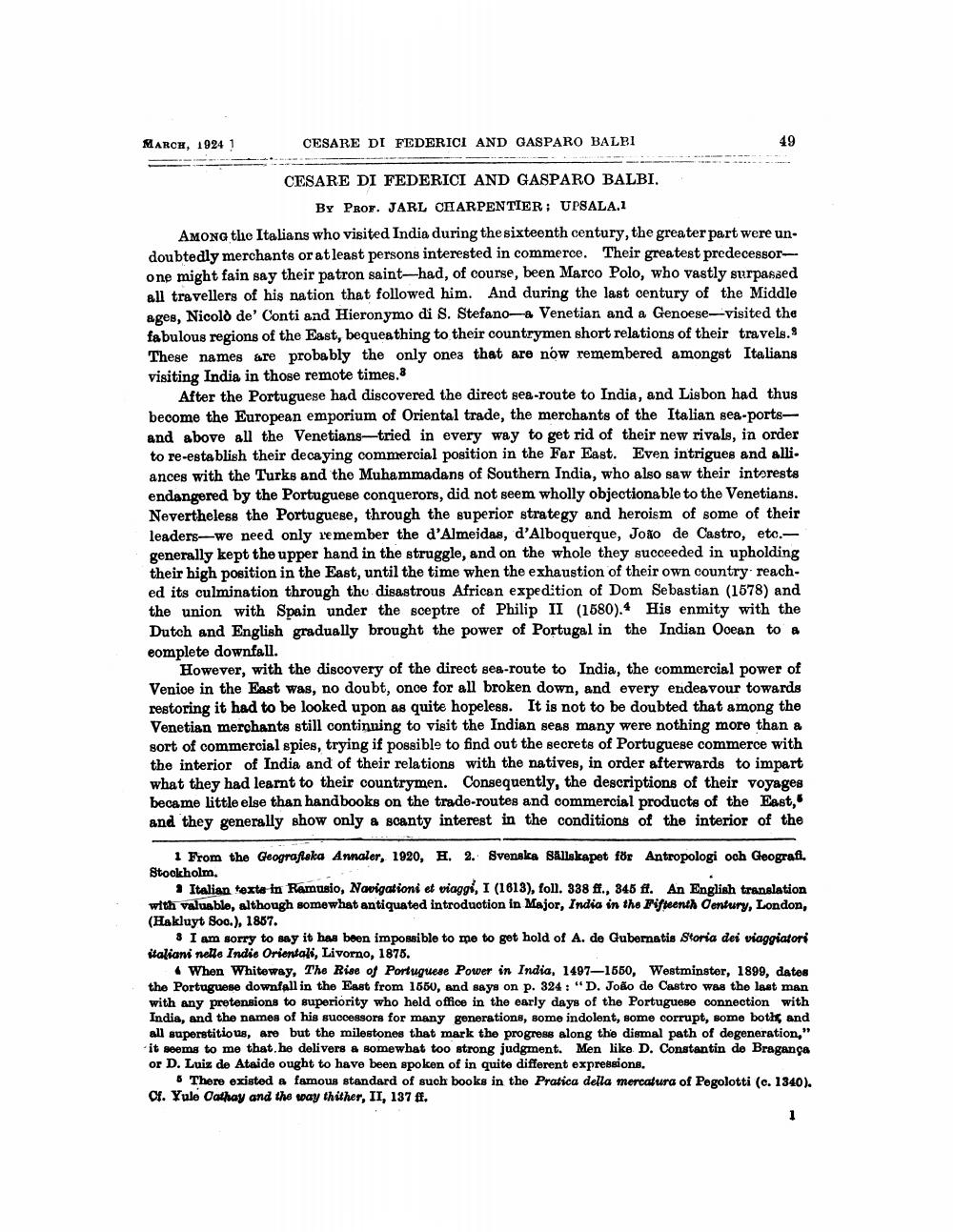________________
MARCH, 1924
CESARE DI FEDERICI AND GASPARO BALBI
CESARE DI FEDERICI AND GASPARO BALBI.
By Pror. JARL CHARPENTIER: UPSALA.1 AMONG the Italians who visited India during the sixteenth century, the greater part were undoubtedly merchants or at least persons interested in commerce. Their greatest predecessorone might fain say their patron saint-had, of course, been Marco Polo, who vastly surpassed all travellers of his nation that followed him. And during the last century of the Middle ages, Nicold de' Conti and Hieronymo di S. Stefano-a Venetian and a Genoese-visited the fabulous regions of the East, bequeathing to their countrymen short relations of their travels. These names are probably the only ones that are now remembered amongst Italians visiting India in those remote times.8
After the Portuguese had discovered the direct sea-route to India, and Lisbon had thus become the European emporium of Oriental trade, the merchants of the Italian sea-portsand above all the Venetians--tried in every way to get rid of their new rivals, in order to re-establish their decaying commercial position in the Far East. Even intrigues and alli. ances with the Turks and the Muhammadans of Southern India, who also saw their interests endangered by the Portuguese conquerors, did not seem wholly objectionable to the Venetians. Nevertheless the Portuguese, through the superior strategy and heroism of some of their leaders-we need only remember the d'Almeidas, d'Alboquerque, João de Castro, etc.generally kept the upper hand in the struggle, and on the whole they succeeded in upholding their high position in the East, until the time when the exhaustion of their own country reached its culmination through thu disastrous African expedition of Dom Sebastian (1578) and the union with Spain under the sceptre of Philip II (1580). His enmity with the Dutch and English gradually brought the power of Portugal in the Indian Ocean to a eomplete downfall.
However, with the discovery of the direct sea-route to India, the commercial power of Venice in the East was, no doubt, once for all broken down, and every endeavour towards restoring it had to be looked upon as quite hopeless. It is not to be doubted that among the Venetian merchants still continuing to visit the Indian seas many were nothing more than a sort of commercial spies, trying if possible to find out the secrets of Portuguese commerce with the interior of India and of their relations with the natives, in order afterwards to impart what they had learnt to their countrymen. Consequently, the descriptions of their voyages became little else than handbooks on the trade-routes and commercial products of the East, and they generally show only a scanty interest in the conditions of the interior of the
From the Geografiska Annaler, 1920, H. 2. Svenska Sällskapet för Antropologi och Geografi, Stockholm,
Italian texta in Ramusio, Navigations et viaggi, I (1613), foll. 338 ff., 345 ft. An English translation with valuable, although somewhat antiquated introduction in Major, India in the Fifteenth century, London, (Hakluyt Soc.), 1867.
8 I am sorry to say it has been impossible to me to get hold of A. de Gubernatis Storia dei viaggiatori italiani nelle Indie Orientali, Livorno, 1875.
When Whiteway, The Rise of Portuguese Power in India, 1497-1550, Westminster, 1899, dates the Portuguese downfall in the East from 1550, and says on p. 324 : "D. João de Castro was the last man with any pretensions to superiority who held office in the early days of the Portuguese connection with India, and the names of his successors for many generations, some indolent, some corrupt, some both, and all superstitions, are but the milestones that mark the progress along the dismal path of degeneration," it seems to me that, he delivers & somewhat too strong judgment. Men like D. Constantin de Bragança or D. Luiz de Ataide ought to have been spoken of in quite different expressions.
There existed a famous standard of such books in the Pratica della mercatura of Pegolotti (c. 1340). cf. Yule Oathay and the way thither, II, 137 ff.




